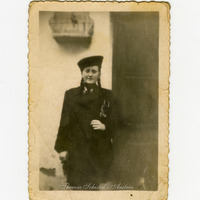C2a-170: From Austria to Saltaire
Item
- Identifier
- C2a-170
- Title
- From Austria to Saltaire
- Type
- Format
- Creator
- Smith, Maggie
- Description
- Booklet: 'From Austria to Saltaire - Theresa Schistal' with 3 loose photocopied photographs of Theresa Mortimer (nee Schistal). Account of Theresa Schistal travelling from Austria to Saltaire in late 1940s to work in Salts Mill.
- Associated person or organisation
- Schistal, Theresa
- Associated dates (range)
- 1940 – 1949
- Source
- Gift: Mortimer, Theresa
- Rights
- Only viewable in the Saltaire Collection
- Rights Holder
- Copyright Maggie Smith
- Access Rights
- To view the full story please contact the Saltaire Collection
- Abstract
-
Theresa was born in a small village called Mattersberg, just outside Vienna, Austria on the fifth of January 1931 and her baptismal name was given as Therisia. Her father, Johann was Hungarian, and her mother Rosalia (Rosi) was Austrian. Theresa had three brothers and was born as the Nazi Party were coming to ascendancy in Germany, led by the Austrian born Adolf Hitler. Her story was recorded after her death in 2015 by her son Mark and donated to the Saltaire Collection.
Theresa experienced many political upheavals and changes in the lives of Austrian people as Nazism overtook the country of her birth – placing German troops in her country initially. Along with all young people in Austria and Germany Theresa was compelled to join the Hitler Youth Movement but frequently found relief from the pressures of dictatorship through spending time in the nearby forests and through her love of animals.
As the war in Europe neared its end, Austria was over-run by Russian troops who, for a time, took control of her country through bloody fighting on the ground. After the fall of Stalingrad many atrocities were visited on German and Austrian citizens by Russian soldiers as they advanced on Berlin.
Theresa’s son, Mark recalls his mother’s stories of some of the disturbing and uncertain times she lived through in her childhood and young adulthood. He recalls some of these stories, from the end of the war. For example, when the Russians had invaded, Theresa was so terrified of what the Russian soldiers may do to her that she hid from them under the dead bodies all around her.
Although Theresa had been granted Austrian citizenship on December 2, 1946, as Austria began to emerge as a nation again, her experiences had been very traumatic, and employment was difficult to find. She decided to seek work in England through the European Voluntary Workers Scheme. How she travelled to England and the exact date she arrived are not known but after a first reception in a European Voluntary Workers’ Hostel in York, she was able to gain employment in Salts Mill in 1949 and was also resident there in hostel provision developed by the mill managers to receive European workers after World War 2.
All the young women from Europe employed at Salts Mill were well looked after – albeit that the two ‘matrons’ in charge of the hostel were strictly in control of their lives. Mark recalls his mum reminiscing about that the two women employed to look after them in the hostel, who were apparently very strict and maintained a 9 pm curfew when all had to be in the residence. Many of the girls would creep out of the windows once all clear was given! Theresa married an English man and remained living in the Bradford District. She was able to experience a good social life and have fun due to her new found independence resulting from finding employment in the local Saltaire and Bradford textile industry. The relief from her stressful experiences in Austria during and after Nazi control will have been enormous – nevertheless she remained proud of her national origins throughout her life. - Has Format
- image
- Item sets
- Site pages
Export
Catalogue data (excluding media) available under Creative Commons Attribution-ShareAlike (CC BY-SA 4.0) licence.


